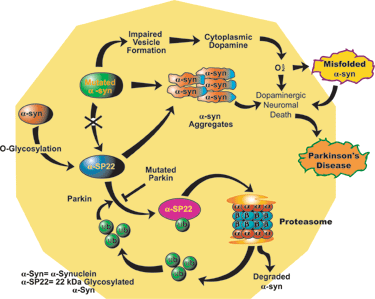
U.S. researchers have succeeded in using therapeutic cloning to treat Parkinson's disease in mice, according to the latest issue of the science magazine Nature Medicine available here on Sunday.
It is the first time animals have been successfully treated with their own cloned cells, researchers from the Memorial Sloan-Kettering Cancer Center claim.
In Parkinson's disease, nerve cells in the part of the brain that controls muscle movement either die or become impaired.
These nerve cells normally produce a vital chemical known as dopamine, which allows smooth, co-ordinated function of the body's muscles and movement.
In therapeutic cloning, the nucleus of a cell is inserted into an egg with the nucleus removed and this cell then develops into an embryo from which stem cells can be harvested and used as a treatment.
The mice that received dopamine-producing neurons derived from their own clones showed significant signs of improvement, but when these neurons were grafted into mice that did not genetically match the transplanted cells, the cells did not survive and the mice did not recover, according to the researchers.
The researchers say the therapy is promising because, as the cells originally came from the animal that was ill, they were not rejected by its immune system.
Scientists are pursuing the use of stem cell therapy for Parkinson's disease because it would allow the replacement of the dead dopamine-producing nerve cells with new, healthy cells.
The U.S. study provides the best evidence so far that the controversial technique (cloning) could one day help people with Parkinson's disease.
U.S. researchers have succeeded in using therapeutic cloning to treat Parkinson's disease in mice, according to the latest issue of the science magazine Nature Medicine available here on Sunday.
It is the first time animals have been successfully treated with their own cloned cells, researchers from the Memorial Sloan-Kettering Cancer Center claim.
In Parkinson's disease, nerve cells in the part of the brain that controls muscle movement either die or become impaired.
These nerve cells normally produce a vital chemical known as dopamine, which allows smooth, co-ordinated function of the body's muscles and movement.
In therapeutic cloning, the nucleus of a cell is inserted into an egg with the nucleus removed and this cell then develops into an embryo from which stem cells can be harvested and used as a treatment.
The mice that received dopamine-producing neurons derived from their own clones showed significant signs of improvement, but when these neurons were grafted into mice that did not genetically match the transplanted cells, the cells did not survive and the mice did not recover, according to the researchers.
The researchers say the therapy is promising because, as the cells originally came from the animal that was ill, they were not rejected by its immune system.
Scientists are pursuing the use of stem cell therapy for Parkinson's disease because it would allow the replacement of the dead dopamine-producing nerve cells with new, healthy cells.
The U.S. study provides the best evidence so far that the controversial technique (cloning) could one day help people with Parkinson's disease.
(Agencies via Xinhua News Agency March 25, 2008)